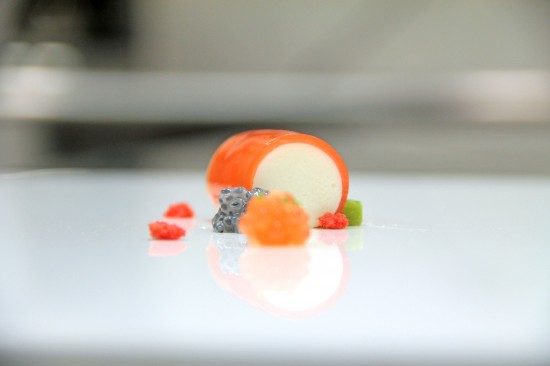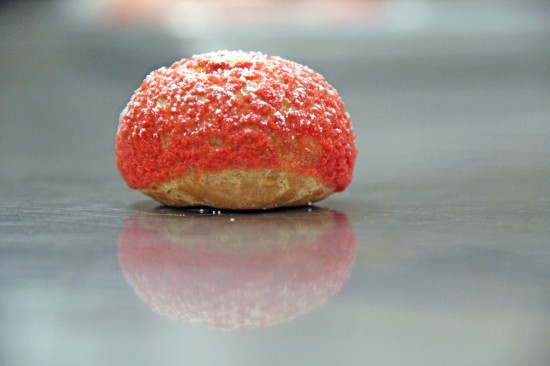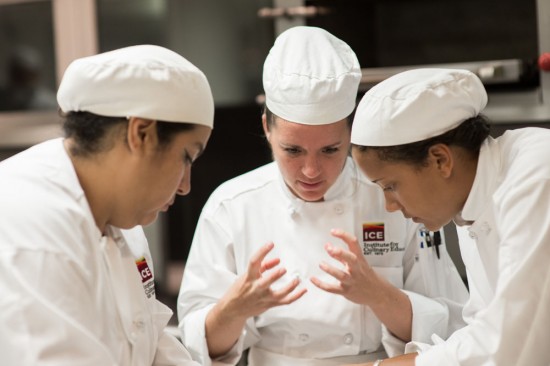Sometimes the only thing better than finding inspiration on your own is witnessing someone else’s process of discovery. I see this spark in students all the time, when a visible realization of an idea or technique strikes, when the proverbial “light bulb” turns on. In my current position at ICE, making that connection is the most important aspect of what I do.
Yet while ICE’s classroom kitchens regularly provide opportunities for inspiration, the routine of the professional kitchen often presents fewer of those moments. Chefs must actively seek out new experiences and learning opportunities. However, it’s not just about keeping on the lookout for a revelation that will become the next dish on your menu. Inspiration can also be a means to remind us of the reasons why we started cooking in the first place.
From time to time all cooks need a eureka! moment: a short, sharp shock of inspiration that fuels our sense of purpose. For some, it may come from a singular triumph—one dish or dinner service—which, however small, allows the bigger picture to fall into perspective. Or maybe inspiration springs from an isolated disaster—something positive can be spun from that too.
Cooks may even find clarity in working through the many monotonous tasks in the kitchen—many chefs believe you don’t truly master a task until you’ve practiced it a thousand times. Of course, there is also a world full of new ingredients to be tasted.

These moments don't necessarily have to be life-changing, but their influence is significant. They can provide the energy to get us through one more day or a particular challenge, or provide the missing link that brings an old idea full circle. I often think back to my earliest days, when everything was new, and each newfound skill provided a foundation for the next.
These vivid memories can be inspiring themselves, as they transport me to a distinct time and place, a precise moment of “before” and “after” a noteworthy discovery. I've had so many little such sparks that I've no doubt forgotten the majority of them. But off the top of my head, here are some of the grand and small eureka moments over the course of my career:
- A dish at Restaurant Pierre Gagnaire that amazed me so much I nearly burst into laughter
- The combination of blueberry pie and coffee at a picnic table in Massachusetts
- Breakfast at the Tsukiji market in Tokyo, of raw fish so fresh it was still moving
- My first successful laminated dough
- Strolling the garden at the French Laundry between courses, peeking into the kitchen and noticing how quiet it was. After dinner, I noticed the word “finesse” posted above the kitchen door.
- The day I bought a copy of the Larousse Gastronomique
- The first time I tasted raw pulp from a cacao bean
- Lunch at Le Bernardin in 1998: skate sautéed in goose fat with a squab jus
- Strolling the streets of Paris at 7 a.m., with the unmistakable smell of financiers wafting down the block from Poujauran
- When I finally understood the underlying science of making ice cream
- Cooking at a winery in Napa Valley: We needed a lemon, and I was told, "Just go outside and pick one."

You'll notice that the great majority of these moments were the result of travel. It's true: our senses are hyper-acute when we leave our familiar surroundings, so it makes sense that we would be more open to inspiration. But most of us (myself included) can't just hop on a plane for France or Spain or Japan whenever we feel like it.
I remind myself all the time how lucky I am to live in a place like New York City, where there is no shortage of food-related stimuli, and, in truth, it can be even more special to find inspiration when we aren't actually looking for it—in the “monotony” of kneading dough or chopping vegetables.
And yet, the eureka muscle may be one we can develop with time and intention. Go to the supermarket with a pair of fresh eyes. Talk to your ingredients, and listen to what they may have to say in response. If there's a food you can't stand eating, force yourself to try it again and ask yourself why. Buy a new kitchen tool and learn how to use it. Plant a garden, or at least a pot of herbs, and consider the processes at work. Learn how to make bread and study its inner architecture. Practice cleaning a fish and take notice of the anatomy. Intentionally “break” a sauce or ganache and see if you can fix it. Make a complex dish from a trendy cookbook and a more traditional dish from an iconic text.
As long as it's something you've never done before, your choice of activity really doesn't matter. Moreover, this advice extends beyond professional cooks; I’d like to think everyone could use a positive little nudge in the kitchen. Look for the answers to your own questions. Then turn every answer into another question. Challenge yourself, try something new, if not once a day, then once a week. It may or may not change your life, but it certainly will make what formerly seemed like “just another day” far more interesting.
Want to study with Chef Michael? Click here for a full list of his advanced pastry classes at ICE.





